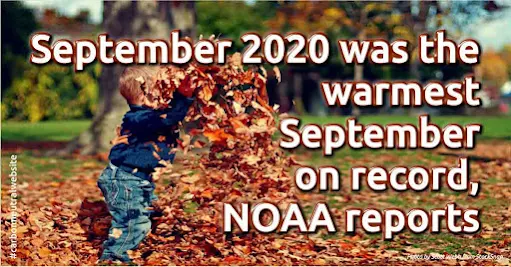Your carbon-neutral website certifies your voluntary contribution to make the Internet more climate-friendly.
Choose Website Offset from the menu to compensate for the carbon emissions caused by your website and social media presence by supporting verified climate protection projects.
Choose Website Offset from the menu to compensate for the carbon emissions caused by your website and social media presence by supporting verified climate protection projects.
 |
| Add caption |
"Eight weather-related disasters that occurred last month caused $1 billion or more in damage.
September 2020 was the warmest September since global record keeping began in 1880, NOAA’s National Centers for Environmental Information, NCEI, reported October 14.
The month was just 0.02 degrees Celsius warmer than the previous record, held jointly by September 2015 and 2016. NASA and the European Copernicus Climate Change Service also rated the month as the warmest September on record, and the Japan Meteorological Agency rated it as the third-warmest September on record. Minor differences in rankings often occur among various research groups, the result of different ways they handle data-sparse regions such as the Arctic.
The nine months of January through September were 1.02 degrees Celsius (1.84°F) above the 20th-century average, NCEI reported. That nine-month period ranks as the second-warmest such period on record, only 0.04 degrees Celsius (0.07°F) behind the record set in 2016. According to NCEI’s annual temperature outlook, the year 2020 is virtually certain to rank among the five warmest years on record, making each of the seven calendar years 2014 through 2020 one of the seven warmest years on record, dating back to 1880.
The NCEI outlook finds that 2020 has a 65% chance of displacing 2016 as the warmest year on record, and a 35% chance of being the second-warmest year on record. These odds are based on statistical relationships rather than unfolding weather and climate events, and the La Niña event now in progress (see below) will make 2020 less likely to be the warmest year on record." ~Jeff Masters, Ph.D. @Yale Climate Connections
.